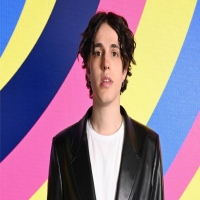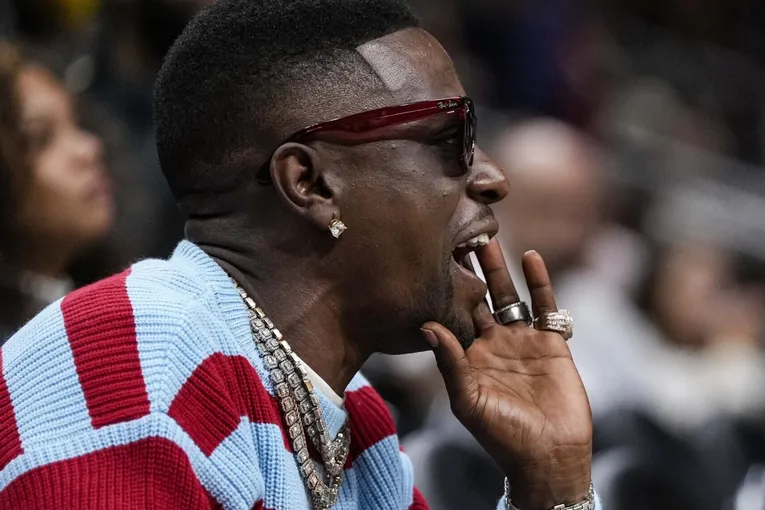The best way to navigate your way out of feeling lost is often to make your own map. For a polymath like Tunde Adebimpe – frontman of 00’s indie icons TV On The Radio, celebrated visual artist and actor who you may have seen in the likes of Twisters, Spider-Man: Homecoming, and Star Wars: Skeleton Crew – kicking the muse is a lifeline. “It’s all I’ve ever known: a mess,” he laughs, surrounded by boxes and paintings in his NYC garage-meets-studio.
‘Thee Black Boltz’, his debut solo album, was born from stasis and grief following his band being put on ice in a time of a pandemic, political turmoil, and the death of his sister. Oh, and said garage being broken into and hoodlums taking off with 15 years’ worth of TV On The Radio demos on hard drives that Adebimpe was hoping to revisit. “I had to snap myself into a reset of what I was going to do,” he says. “I had to make a plan and get back to it.”
He picks up a weathered notebook. “Well, it’s right here,” Adebimpe smiles, “this is ‘the Boltz Masterplan’. There’s a lot of madness in here.” Flicking through the pages he shows us how the record came to be: from schedules through to his sonic moodboard (Fever Ray, Little Dragon, Björk’s ‘Homogenic’ and ‘Post’, Suicide, The Stooges, Grace Jones – the list goes on) through to general vibes, song titles, lyrics, cartoonishly nightmare sketches and a guestlist of dream collaborators that never came to be.
Going back to the analogue basics of Adebimpe’s early days with collaborator Wilder Zoby, ‘Thee Black Bolts’ buzzes with a warm neon glow – a rave against the dying of the light. We caught up with the multi-hyphenate to talk about going back to rediscovery, legacy, and art being a guide through tragedy.
NME: Hello Tunde. How would you describe the character of what ‘Thee Black Boltz’ came to be?
Tunde Adebimpe: “It’s reflective of that mixtape feeling. When TVOTR took a break, I was kind of burned out – just with certain aspects of being in a band that were outside of making music and playing. I thought a lot about mixtapes that friends would make for each other and trade in high school. That was around 1993 when I heard a lot of things that made me decide who I wanted to be and what I did not want to be around. That catapulted me to go to New York and find like-minded people. I wanted to go where I was one of many weirdos instead of one of five whose time was running out.
“I remember a friend gave me a tape that had both Minor Threat and The Sugarcubes on it, who I didn’t know anything about. It also had 808 State and weird techno I’d never heard of. I played those mixtapes to death. It felt like a gift: ‘I curated this for you, and I know you’re going to curate something for me’. I think that comes through on the record.”
The record is dedicated to your late sister. Did you find that losing someone so close actually gave you a new sense of purpose?
“Absolutely. It’s dedicated to my younger sister, but also my dad and older brother. My dad passed away in 2005 before [TV On The Radio’s second album] ‘Return To Cookie Mountain’ came out. Then, in 2008, my brother died very suddenly as we were making ‘Dear Science’. I went on tour after that, then our bassist, Gerard [Smith], passed away in 2011.
“Then I went back on tour again. When the band took a break, it was the first time I had a second to be like, ‘Oh that’s a lot of shit’. Not to be too literal about it, but it was like the universe was taking shots: taking the person to the left of you out, then to the right, plus the person responsible for you being here.”

“That will definitely give you a sense of purpose. We should make the best use of the time we have here because we just don’t know. All of these people are responsible for me doing what I’m doing. They would want me to keep going and make what I’m going to make. I did, and this record was a good landing spot for a lot of that.
“Even the worst fucking depression and justified grief; I feel lucky that I have this mechanism where I can turn that into something. I really don’t know what I’d be doing if I couldn’t. I hope people get something out of this record.”
As a bare minimum, it really slaps.
“Oh, thank you, mate! I appreciate that.”
Having slammed the brakes on and taken stock through making this record, do you feel differently about TV On The Radio now?
“Of course. The last shows we played together [in 2024] were ecstatic. They really were some of the best shows we’ve ever played. Everybody went away and learned their kung-fu and sat on a mountain somewhere, and I realised that what I missed was doing this thing with people I love very much. You get to whip up this thing that’s bigger than all of you and conjure up something out of nothing and share that with people.
“I would love for us to record more, and I’m sure that we will. It’s been fun messing around at soundchecks and stuff. I’m psyched to be doing all this music. I’ve got a record coming out, which is amazing, meanwhile there’s a gameshow host in the White House and people in America are getting snapped off the streets for saying ‘Free Palestine’. It’s deeply fucking weird.”
And have you taken much stock of your legacy? When TVOTR broke, there didn’t seem to be that many people of colour in the indie scene. Now with artists like Spellling, Bartees Strange, and Rachel Chinouriri in the alt world, do you feel your impact?
“I did an artist-to-artist interview with Bartees recently. I met him a few years ago, and it’s been a joy to be friends with him. I was recently doing an interview with this young, queer, Ugandan, first-generation immigrant who was super punk rock and had a bunch of face piercings. This was the person I wish was around when I was 16 or 17. If there were seven or eight of us in Pittsburgh, we would have taken over the fucking world and none of this marginalism within marginalism in this genre would have been a thing. He told me, ‘You’re who I want to be when I grow up’. That was one of my more emotional moments. I had Bartees tell me that he saw the ‘Wolf Like Me’ performance on Letterman and thought, ‘That’s what I want to do’.
“All this music stuff is throwing out a message in a bottle. I never made anything specifically for anyone, so when it comes back to you like that, I feel so glad. It should just be so normal for anyone in any genre to be able to be a part of it if they love it. Art should form a representation of who’s on the fucking planet. The thing that should be weird is the material produced, not that certain people are doing it.”
You’ve also said that the title ‘Thee Black Boltz’ sounds like a name for a cool metal band. Who would be with you in the coolest metal band of all time?
“It would be nice to have Lemmy from Motörhead somewhere in the mix, maybe Dave Lombardo of Slayer, Robert Trujillo from Metallica.”
That’s two bassists…
“We’ll have Darryl Jenifer [Bad Brains] in there too – another bass player. That would be so rad!”
Tunde Adebimpe’s ‘Thee Black Boltz’ is out now on Sub Pop. TV On The Radio tour North America, the UK and Europe throughout summer 2025







